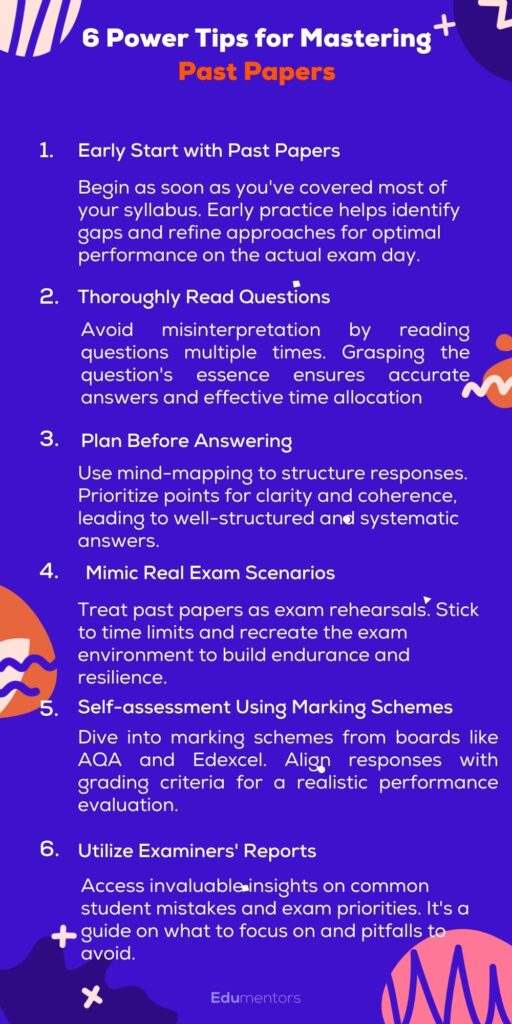A-level Past Papers -The Best Revision Technique
Facing the A-level challenge can feel daunting. Understandably, the weight of the pressure on your shoulders might be overwhelming. But guess what? You’re not alone in this and there’s a golden key that can unlock your potential: past papers. With insights from exam boards like AQA, CCEA, Edexcel, and others, these resources are more than just papers; they’re your roadmap, guiding you through the maze of revision. While the journey might be intense, armed with the right tools and strategies, success is within your grasp. Let’s explore the power of past papers and transform that anxiety into achievement 🌟. Stand tall, stay focused, and let’s conquer your A-levels together! 💪🎓
What are Past Papers?
Diving into the world of A-levels, you might often hear the term “past papers” echoing throughout revision sessions, study groups, and tutor recommendations. So, what exactly are these past papers and why are they considered the cornerstone of exam preparation?
Definition of Past Papers and Their Significance in Exam Preparation
Past papers are not just mere collections of questions. They represent a treasure trove of insight, history, and foresight into what an A-level exam entails. These are the actual exam papers that students like you sat for in previous years. By analysing them, you get an unmatched view into the structure, style, and variety of questions that have been asked – and by extension, might appear again.
Consider them as your time machine. They allow you to travel back to understand the exam’s rhythm, its nuances, and its challenges. But more than understanding, it’s about adapting. When you solve past papers, you’re training your mind to think, respond, and perform as it would need to on the actual exam day.
By weaving these papers into your revision fabric, you’re not only getting a realistic rehearsal but also a diagnostic tool. They highlight your strengths, expose your areas of improvement, and, most importantly, reduce the fear of the unknown. The more you practise, the clearer the picture becomes – both of what’s expected of you and what you can achieve.
List of Past Papers
Different Exam Boards: AQA, CCEA, Edexcel, OCR, SQA, and WJEC
Diversity is a hallmark of the UK’s educational landscape, reflected brilliantly in its range of exam boards. Each board, while adhering to a high standard of education, brings its own flavour, style, and nuances to the A-level exams.
AQA
Assessment and Qualifications Alliance-A dominant presence, AQA is celebrated for its vast array of qualifications and pioneering educational resources.
CCEA
Council for the Curriculum, Examinations & Assessment- Exclusively catering to Northern Ireland, CCEA offers a unique blend of qualifications and resources tailored to its demographic.
Edexcel
Birthed from the union of BTEC and University of London Examinations, Edexcel stands tall as a beacon of academic excellence, offering some of the most sought-after qualifications in the UK.
OCR
Oxford, Cambridge, and RSA Examinations- With a legacy tied to historic academic institutions, OCR brings to the table a rich tradition of quality qualifications, including A-levels.
SQA
Scottish Qualifications Authority-As Scotland’s flagship qualifications authority, SQA provides a suite of robust, internationally acclaimed qualifications, ensuring that Scottish education resonates globally.
WJEC
Representing the Welsh spirit, WJEC provides qualifications in both English and Welsh, emphasising inclusivity and diversity.
Navigating through these boards, you’ll find a vast reservoir of past papers, each shedding light on the board’s approach, style, and expectations. While they all aim for academic excellence, understanding the slight variations can be instrumental in tailoring your revision strategy to the specific board you’re facing.

How Do Examiners’ Reports and Mark Schemes Provide Insights into A-Level Exams?
Stepping into the realm of A-levels can feel like navigating a maze. Yet, imagine if you had a map, a guideline that details the path and highlights potential pitfalls. That’s exactly what examiners’ reports and mark schemes offer. These tools, although sometimes overlooked, are goldmines of information that can drastically sharpen your preparation strategy.
What is Marking Scheme and its Role in the Examination Process
A marking scheme is the structured guideline examiners follow when grading your answers. Think of it as the answer key, but rather than just providing solutions, it details how marks are distributed for each question. These schemes are meticulously crafted by the exam boards, ensuring a standardised grading process across all papers.
At the heart of every A-level exam is the objective to assess your grasp over the subject. The marking scheme ensures this process is transparent and consistent. For instance, a long-answer question might have marks designated for specific points, explanations, or methods. Understanding this breakdown not only allows you to gauge what’s expected in answers but also helps refine your writing approach to maximise marks.
Criteria Used for Grading and How Students Can Use This to Their Advantage
The criteria for grading aren’t just about the correctness of an answer. They encompass various facets like clarity, methodology, relevance, and depth. By delving deep into mark schemes, you uncover these layers and the specific attributes that fetch higher marks. For instance, in subjects like History or English, the quality of argument, use of evidence, and coherence might be as vital as the actual content.
For science subjects, while the final answer is crucial, the method you employ or the steps you undertake can also hold significant weightage. By aligning your revision strategy with these grading criteria, you not only target the right answers but also the right approach, ensuring that every answer you pen down is optimised for the highest possible score.
The Significance of Examiners’ Reports in Identifying Common Mistakes Made by Past Students and Areas of Focus
Examiners’ reports are like post-match analyses. They detail how students performed, what they aced, where they stumbled, and the common pitfalls they fell into. These reports are penned down by the very people who grade countless papers, providing a bird’s eye view of areas where students traditionally excel or falter.
Such insights are invaluable. For example, if an examiner’s report consistently highlights that students misinterpret a particular type of question, you’re forewarned to approach similar questions with added caution. On the flip side, if a topic is frequently well-handled, you can perhaps afford to allocate fewer revision hours to it.
In essence, these reports help you streamline your revision, ensuring you focus your energy and time on areas that genuinely require attention, thereby minimising errors and maximising performance.

Why are Past Papers the Best Revision Technique?
When gearing up for A-level exams, a myriad of revision techniques and strategies flood our minds. From group studies to mind maps, flashcards, personal tutoring like Edumentors. The options can be overwhelming. However, amidst this sea of methods, past papers emerge as a beacon, a tested and trusted ally for countless students. Why do they hold this prime position?
Emphasis on the Real-Time Experience Past Papers Offer
Past papers aren’t just about questions and answers; they offer an authentic simulation of the exam experience. Every time you sit down with a past paper, you’re essentially in a dress rehearsal for the final show. This real-time practice not only familiarises you with the exam’s rhythm but also combats the anxiety of facing the unknown. Knowing what to expect removes the element of surprise, ensuring that on the D-day, you’re not just answering questions, but doing so with a seasoned finesse.
Discussion on the Benefits
Familiarity With the Type of Questions
Delving into a multitude of past papers introduces you to the vast range of questions that the exam boards, be it AQA, CCEA, Edexcel, or others, might throw your way. With every paper, you unravel new patterns, different angles to familiar topics, and nuances that regular revision might overlook. This intimate acquaintance ensures that on exam day, no question format catches you off-guard.
Practice Under Real Exam Conditions
Merely understanding the subject is half the battle won. The real challenge is delivering this knowledge under the ticking clock. Past papers offer you the chance to simulate this pressure, building resilience and time-management skills. By practising consistently under exam conditions, you adapt to the pace, perfecting the art of allocating appropriate time to each section.
Identification of Strengths and Weaknesses
Past papers serve as mirrors, reflecting your academic prowess and areas of improvement. Each attempt gives a clearer picture of topics you face effortlessly and those that demand extra attention. This continuous feedback loop ensures that your revision is dynamic, adapting to your evolving needs and focusing on areas that truly matter.
Insights into Effective Revision Techniques
Beyond just answering, past papers pave the way for smarter revision. When coupled with mark schemes and examiners’ reports, they shed light on the best strategies to tackle questions, the common pitfalls to avoid, and the nuances that make an answer stand out. By incorporating these insights into your revision plan, you elevate its efficacy, ensuring that every hour spent studying yields maximum results.
Navigating Different Exam Boards Through Past Papers
Stepping into the world of A-levels, one quickly realises the sheer diversity of exam boards, each with its unique format, structure, and set of expectations. Amidst this complexity, how does one ensure consistent and comprehensive preparation? The answer lies in effectively navigating past papers from these boards. Let’s see how these varied resources can be a linchpin in your A-level success story.
Highlighting the Variety of Past Papers Available, such as Those Based on Different Exam Boards
The UK boasts a plethora of exam boards, from AQA, CCEA, Edexcel, to OCR, SQA, and WJEC. Each board, with its distinctive style, brings to the table a myriad of past papers that shed light on its examination approach. These papers aren’t mere resources; they are windows, offering glimpses into the mindsets of the examiners and the standards expected from students.
Importance of Accessing and Practising a Diverse Range of Papers to get a Comprehensive Grasp
While it’s essential to focus on your specific exam board, diversifying your practice portfolio can be hugely beneficial. By exploring papers from different boards, you expose yourself to a wide variety of questions, enhancing adaptability and broadening your understanding. Such eclectic practice ensures that you aren’t just prepared; you’re A-level ready, irrespective of the curve balls thrown your way.
Where to get Past Papers for Free: Brief Guide to Accessing Free Past Exam Papers
Navigating the realm of A-level revision is now simpler than ever, thanks to a plethora of online resources. Prestigious exam boards such as Edexcel, AQA, and CCEA regularly update their websites with past papers that can be accessed freely. In addition to these official sources, Edumentors stands out as a dedicated platform offering a comprehensive collection of A-level past papers. Numerous educational forums and websites also compile and present these invaluable resources. With such abundant access, every student can make the most of past papers, ensuring that finances are no barrier to academic excellence.
Understanding the Consistent Format of Past Papers Across Years
One of the marvels of past papers is their consistency. Year after year, while the questions might change, the fundamental format, structure, and style largely remain uniform. This predictability is a boon, allowing students to discern patterns, anticipate question types, and approach the exam with a well-defined strategy in mind.
Importance of Familiarising Yourself with the Exam Structure, Types of Questions, and Time Limits
Knowing the content is pivotal, but understanding the examination’s framework is equally critical. Past papers act as blueprints, detailing the exam structure, highlighting the types of questions (from MCQs, short answers to essay-based), and clarifying time limits. This knowledge ensures that you not only answer correctly but also in the most efficient and timely manner.
How Understanding Exam Formats Improves Answering Techniques
With familiarity comes mastery. By repeatedly engaging with past papers and grasping the exam formats, you refine your answering techniques. Whether it’s structuring essays, allocating time for calculations, or decoding complex scenarios, understanding the format equips you with the skills to present your knowledge in the most effective and coherent manner. It’s not just about what you know; it’s about showcasing it in the best possible light.

How to Use Past Papers Effectively
In the grand scheme of A-level preparation, past papers stand out as quintessential tools. However, merely having them isn’t enough. The crux lies in utilising them in the most effective manner. As you gear up to embark on this revision odyssey, let’s delve into some pivotal strategies that can help you make the most of these invaluable resources.
Tips for Maximising Benefits from Past Papers
When Should You Start Doing Past Papers?
The early bird catches the worm. Start integrating past papers into your revision regime as soon as you’ve covered a significant portion of your syllabus. While it’s tempting to leave them for the eleventh hour, starting early provides ample time for iterative learning. With each attempt, you’ll identify gaps, refine your approach, and progressively enhance your performance, ensuring that by the time D-day arrives, you’re in your prime form.
Reading Questions Multiple Times
The devil is in the details. Often, students misinterpret questions due to a cursory read, leading to avoidable errors. Make it a habit to read questions multiple times, ensuring you’ve grasped the core essence. This practice not only aids in accurate answering but also in effectively allocating time based on the question’s complexity.
Mind-Mapping and Planning Answers
An architect wouldn’t build without a blueprint; similarly, diving into answers without a plan can lead to unstructured and incoherent responses. Before penning down, take a few moments to mind-map your thoughts, structure your answer, and prioritise points. This ensures clarity, coherence, and a systematic presentation, attributes examiners highly value.
Simulating Real Exam Conditions
Past papers aren’t mere exercises; they’re rehearsals for the main event. Whenever possible, simulate real exam conditions. This means adhering to time limits, avoiding distractions, and replicating the examination environment. Such practice not only improves time management but also builds endurance and resilience, crucial for the actual examination day.
Using the Marking Scheme to Self-Assess
After attempting a past paper, dive deep into the marking scheme. These schemes, provided by boards like AQA, Edexcel, and OCR, offer granular insights into how answers are graded. By aligning your responses with these criteria, you gain a realistic understanding of your performance, helping you finetune your preparation strategy.
Leveraging Examiners’ Reports to Understand Common Pitfalls
Examiners’ reports are goldmines of insights. These reports, released by various boards, highlight common mistakes students make, areas of strength, and aspects that require attention. By perusing these, you not only sidestep prevalent pitfalls but also gain a clearer perspective on what examiners prioritise and value. In essence, it’s like having a cheat sheet, guiding you on what to do and what to avoid.

Conclusion
The culmination of your A-level journey is approaching, and amidst the vast ocean of revision tools, past papers stand as lighthouses, guiding you towards success. These aren’t mere sets of questions; they’re archives of real exam experiences, curated by renowned boards like AQA, Edexcel, OCR, and others. Delving deep into them provides unparalleled insights, equipping you with the knowledge and strategy to tackle any curveball the exam might throw. 📘✨
To all the A-level aspirants, remember that every champion has a strategy, and integrating past papers into your revision regime can be yours. These papers bridge the gap between theory and practice, taking you a step closer to acing your exams. So, with unwavering determination and these golden tools at your disposal, let’s set the stage for phenomenal success. Dive into the world of past papers, harness their power, and watch yourself transform into an A-level superstar. 🌟🚀🎓 And at last, If you think that you need special help, do not hesitate to use the help of personal tutors, like Edumentors have. Professional tutors from top universities will help you with your A-levels.
FAQs About A-levels Past Papers
Are Past Papers Effective Revision?
Absolutely! Past papers serve as one of the most effective revision tools for students. They provide a practical experience of the examination setting, allowing students to familiarise themselves with the style, structure, and type of questions they will face. By working through these papers, students can identify their strengths and weaknesses, practice time management, and gain confidence in their preparation. Furthermore, they offer insights into potential topics of emphasis, common pitfalls, and areas that need further study. In essence, past papers bridge the gap between knowledge and exam-readiness, making them an indispensable asset for thorough preparation.
How Many Past Papers are Enough?
The ideal number of past papers to tackle varies depending on the individual’s comfort and familiarity with the subject. However, as a general guideline, students should aim to complete a minimum of 3-5 past papers for each subject to gain a solid understanding of the question format and exam structure. The more papers one practices, the better they’ll become at time management, identifying patterns, and refining their answering technique. It’s essential, though, to balance practising papers with other revision methods to ensure a comprehensive understanding of the subject matter. Remember, it’s not just about quantity but the quality of revision and understanding derived from each paper.








